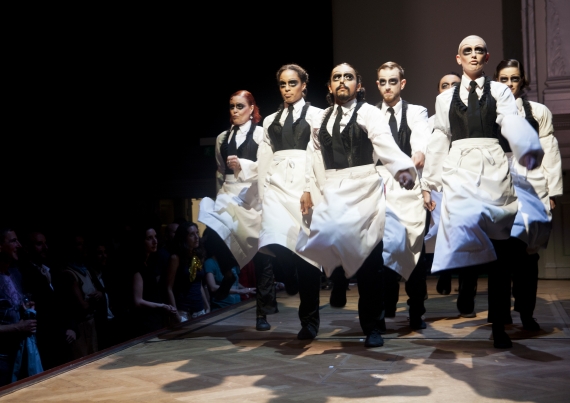Duckie: Lady Malcolm’s Servants’ Ball
Duckie hosted Lady Malcolm's Servants' Ball at Bishopsgate Institute, London, on the 24-25 June 2016.
The setting was like a radical queer take on Downton Abbey as Duckie lifted the lid on the unseen archives of 1920s and 1930s underground LGBT culture when it produced Lady Malcolm’s Servants’ Ball this summer. After ‘Gross Indecency’ in 2010 and ‘Gateways’ in 2013, this was the latest in Duckie’s Vintage Clubbing Series, an homage to the London queers who came before them. One thousand revellers done up in homemade fancy dress took over the sumptuous surrounds of the Bishopsgate Institute, given a revamp by Duckie designer Laura Hopkins. Duckie wanted to explore the working class history of servants at play and salute the queans, dykes, inbetweeners & trans-gressives flocked to the legendary balls originally held at the Royal Albert Hall. Duckie combined a weekend of social history talks, an archive exhibition, vintage fancy dress making workshops, and even published a sixteen page broadsheet newspaper with their findings in the lead up to the ball.
Specially commissioned dance and live art performances included an ambitious dance-drama piece by Florence Peake telling the story of how the authorities attempted to ban ‘undesirables’ (aka queer people) from the ball. This is the kind of popular forms performance that Duckie does best, mixing politics and razzle-dazzle with grand visual storytelling and sexy rebellion. Fusing Busby Berkley with Keystone Cops, live drums and eight dynamic dance performers drawn together for the occasion, the piece really did make history come alive. This was the highlight of a strong bill that mixed teasing participatory performance with a plethora of spectacle.
The gang of butch mavericks that are The Drakes went all Upstairs Downstairs as they transformed into ten identical vintage butlers welcoming the dressed up masses to the ball. Duckie grand dame Neil Bartlett came alive as Madame R. Selavy, society palmist and fortune-teller, inciting the ghosts of queer people past and predicting a queer uprising. Ragtime bunny-hops and old school glamour were on view from The Bees Knees as The Dolly Sisters, whilst Le Gateau Chocolat, Acantha Lang and Lasana Shabazz revealed themselves as iconic jazz figures coming out of the depression era shadows, Wrench & Franks played the night as two desperate variety troubadours, the Pink Dancers displayed an authentic period ballroom ensemble piece, and Christopher Green delivered a pathos infused star-turn as long lost interwar music hall bentertainer Fred Barnes.
The event was presented over three beautiful spaces in the Bishopsgate Institute with the Grand Hall hosting the main shows and the disc jockeys Readers Wifes, Unskinny Bop and Auntie Maureen paying homage to the jazz age and the musical influences the period had on the rest of the century, the ‘Gentlemen’s Club for People of All Genders’ housing the playful interactions of Lucille Power and Sue Frumin’s class based cultural clowning about, and the gorgeous wood panelled grade two listed period library playing home to George Chakravarthi’s subtle taking down of the shameful history of the British Empire, feeding audience members pieces of a specially commissioned cake highlighting the history of colonisation over the globe during this time.
A team of queer historians including Matt Houlbrook, Matt Cook, Stephen Bourne, Chardine Taylor-Stone, James Gardiner, Lois Weaver and Amy Tooth Murphy were invaluable in their research and dissemination of the period in preparation for the thoughtful performance commissions that were presented, and plenty of use was made of the archives at the National Archive, London Metropolitan Archive and the Bishopsgate Institute. Duckie were funded by the Heritage Lottery Fund for this project that also included a display of original materials culled from newspapers, police reports and personal letters from the interwar period. The archive research and curation was headed by social historian E-J Scott with a team of volunteers and the exhibition is still running in the corridors of the Bishopsgate Institute until the autumn, detailing the original painted boys on the rampage, alongside other gender offenders and their camp followers.
Mirroring the original format of the event, the show culminated in a competition for best costume hosted by Amy Lamé in a fine Brechtian acting role as the benevolent high society toastmistress Lady Malcolm and prizes were given to the winners that included a belisha beacon, the Empire State building and an assortment of interwar cleaning products. This is what Duckie does best, participatory community celebrations that involve dressing up inventively and having a playful engagement with the issues being explored. LGBT culture has come along way since the dark days of the 1920s and 30s, from mass arrests to full legal equality, and the one thousand plus participants of this event, held on the night of Gay Pride, are only too aware of their place in history.
As Exeunt Magazine enthused in their report of the night, “There were middle-aged men in mermaid costumes, silver-haired butch women in sharp suits, twenty-somethings in pants and the odd smear of glitter. And seeing them all rub shoulders with warmth and generosity made me glow, a little: there are some things you could only imagine happening at Duckie”.
Categories: Report
Date Posted: 26 July 2016
